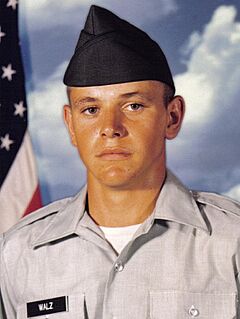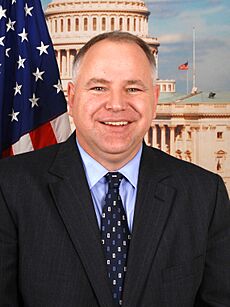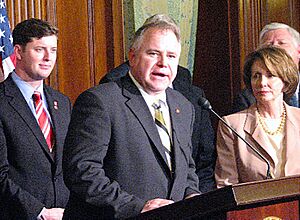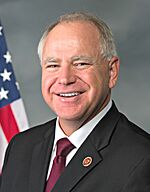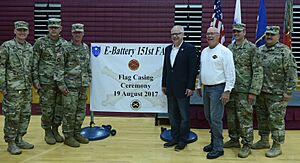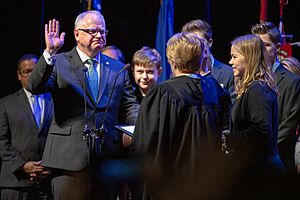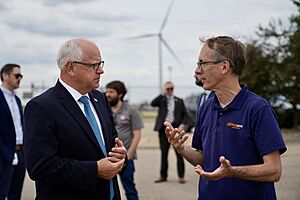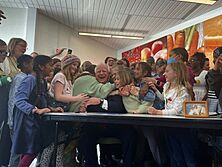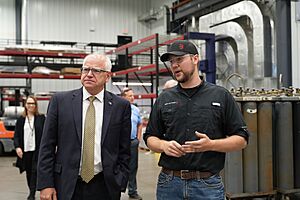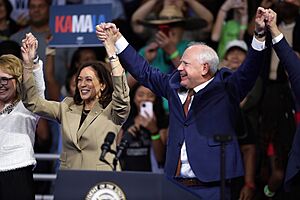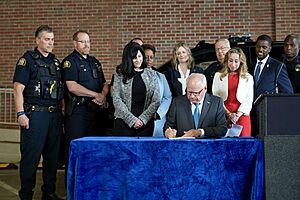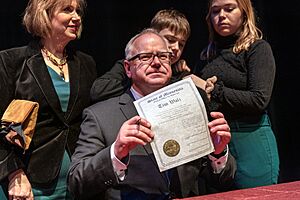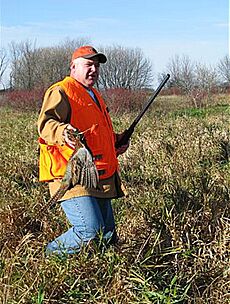Tim Walz facts for kids
Quick facts for kids
Tim Walz
|
|
|---|---|
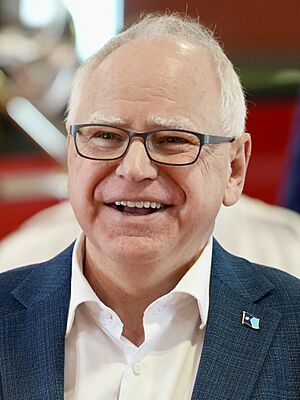
Walz in 2025
|
|
| 41st Governor of Minnesota | |
| Assumed office January 7, 2019 |
|
| Lieutenant | Peggy Flanagan |
| Preceded by | Mark Dayton |
| Ranking Member of the House Veterans' Affairs Committee |
|
| In office January 3, 2017 – January 3, 2019 |
|
| Preceded by | Mark Takano (acting) |
| Succeeded by | Phil Roe |
| Member of the U.S. House of Representatives from Minnesota's 1st district |
|
| In office January 3, 2007 – January 3, 2019 |
|
| Preceded by | Gil Gutknecht |
| Succeeded by | Jim Hagedorn |
| Personal details | |
| Born |
Timothy James Walz
April 6, 1964 West Point, Nebraska, U.S. |
| Political party | Democratic (DFL) |
| Spouse |
Gwen Whipple
(m. 1994) |
| Children | 2 |
| Residences | Governor's Residence Eastcliff Mansion |
| Education |
|
| Signature | |
| Military service | |
| Branch/service |
|
| Years of service | 1981–2005 |
| Rank | Command sergeant major |
| Unit | 1st Battalion, 125th Field Artillery Regiment |
| Battles/wars | |
| Awards |
|
Timothy James Walz (born April 6, 1964) is an American politician. He has been the 41st governor of Minnesota since 2019. Before becoming governor, he was a teacher and served in the Army National Guard. He was also a member of the U.S. House of Representatives from 2007 to 2019.
Walz was born in West Point, Nebraska. After high school, he joined the Army National Guard and worked in a factory. He later went to college in Nebraska and moved to Minnesota in 1996. Before running for Congress, he taught social studies and coached American football in high school. He was first elected to the U.S. House of Representatives in 2006.
Walz was reelected to the House five times. He was a leader on the House Veterans Affairs Committee from 2017 to 2019. He was elected governor of Minnesota in 2018 and reelected in 2022. As governor, he led the state during the COVID-19 pandemic in Minnesota. He also worked on laws for free school meals, improving state buildings, and universal gun background checks.
In August 2024, Kamala Harris chose Walz as her running mate for the 2024 U.S. presidential election. Their team did not win the election.
Contents
Early Life and Education
Timothy James Walz was born on April 6, 1964, in West Point, Nebraska. His mother, Darlene Rose Reiman, was a homemaker. His father, James Frederick Walz, was a teacher and school superintendent. His father had served in the United States Army during the Korean War. Walz has German, Swedish, Luxembourgish, and Irish family roots. He was raised Catholic.
Walz and his three siblings grew up in Valentine, Nebraska, a small town with farms and ranches. In school, he played football, basketball, and ran track. He also enjoyed hunting with friends. When Walz was in high school, his father was diagnosed with lung cancer. His family then moved to Butte, Nebraska to be closer to his mother's relatives. Walz worked on the family farm during summers. He graduated from Butte High School in 1982.
Walz's father passed away in January 1984. Walz then moved to Texas for a time, taking classes at the University of Houston and serving in the Texas Army National Guard. He later moved to Jonesboro, Arkansas, where he worked in a factory and taught in the Arkansas Army National Guard.
Walz returned to Nebraska in 1987 to continue his education at Chadron State College. He was an honor student and active in student government. He graduated in 1989 with a degree in social science education.
Early Career
Teaching Experience
After college, Walz taught for one year in Guangdong, China, starting in August 1989. When he returned to the U.S., Walz became a teacher and coach in Alliance, Nebraska. In 1993, he was recognized as an Outstanding Young Nebraskan.
While teaching, Walz met Gwen Whipple, who was also a teacher. They married in 1994. Two years later, they moved to Mankato, Minnesota, Gwen's home state. Walz taught geography and coached football at Mankato West High School. The football team improved greatly under his coaching, winning a state championship in 1999.
In 1999, Walz became an advisor for Mankato West High School's first student group that supported all students, including those who are gay or straight. He felt it was important to show how different people can work together. For nine years, he and his wife also led educational trips to China for high school students. Walz earned a master's degree in education from Minnesota State University, Mankato, in 2002. In March 2006, he took a break from teaching to run for Congress.
Military Service
Walz joined the Army National Guard when he was 17, encouraged by his father. His father had served in the Korean War and used the G.I. Bill to get his education.
Walz served in the National Guard for 24 years, starting in 1981. He was stationed in places like Arkansas, Texas, Norway, and Italy. He trained with heavy artillery and helped with disaster relief after floods and tornadoes. In 1989, he was named Nebraska Citizen-Soldier of the Year. After serving 20 years, he chose to reenlist, partly because of the September 11, 2001 attacks. He retired from the Guard in May 2005. He reached the rank of command sergeant major near the end of his service.
Walz's military awards include the Army Commendation Medal, two Army Achievement Medals, two National Defense Service Medals, and a Global War on Terrorism Service Medal.
U.S. House of Representatives (2007–2019)
Elections to Congress
On February 10, 2005, Walz announced he would run for the U.S. House of Representatives for Minnesota's 1st congressional district. This district often voted for Republicans. In the 2006 election, he ran against Gil Gutknecht, who had been in office for six terms. Walz won the election with 53% of the vote.
Walz was reelected in 2008 with 63% of the vote. He won a third term in 2010 and was reelected easily in 2012 and 2014. In 2016, Walz won a close race for his sixth term. After that, he decided not to run for Congress again in 2018, choosing instead to run for governor.
Time in Congress
When Walz started in Congress, he became the highest-ranking retired enlisted soldier to serve there. He was also only the fourth Democrat to represent his district. Even though his district often voted Republican, Walz was seen as having moderate to progressive views.
In his first month, Walz was appointed to important committees: the Veterans' Affairs Committee, the Agriculture Committee, and the Transportation and Infrastructure Committee. He also joined the Armed Services Committee. Early on, he supported raising the minimum wage and allowing Medicare to negotiate medicine prices.
Walz was against the Iraq War. He voted against sending more troops to Iraq in 2007. However, he did vote for a bill that provided funding for the war to ensure the safety of American troops.
During the 2008 financial crisis, Walz spoke out against using taxpayer money to help large financial companies. He voted against a $700 billion bailout bill. He also voted against a bill to give $14 billion in government loans to car companies.
Walz voted for the American Recovery and Reinvestment Act of 2009, which aimed to create jobs by investing in roads, bridges, and clean energy. He focused on economic issues important to southern Minnesota, which has large employers like the Mayo Clinic and many small businesses and farms. He supported help for farmers and voted for the American Recovery and Reinvestment Act because it helped public schools. He also supported laws to lower college tuition costs.
In 2008, Walz supported Barack Obama for president. During Obama's time in office, Walz voted to advance the Affordable Care Act. He also strongly supported the STOCK Act, which stops members of Congress from using secret information for their own financial gain.
During the 2013 federal government shutdown, Walz chose not to accept his congressional pay. He donated it to groups that help with hunger. He said the shutdown was "reckless" and could have been avoided.
Walz was known for working with both political parties. He was ranked as one of the most bipartisan House members in 2015.
Committee Assignments
- Committee on Agriculture
- Committee on Veterans' Affairs (leading member from 2017-2019)
- Committee on Transportation and Infrastructure
- Armed Services Committee
Governor of Minnesota (2019–Present)
Elections for Governor
2018 Election
In March 2017, Walz announced he would run for governor after the current governor, Mark Dayton, decided not to seek reelection. Walz won the Democratic primary election in August 2018. On November 6, 2018, he was elected governor, defeating Republican Jeff Johnson.
2022 Election
Walz ran for reelection in 2022. He won the Democratic primary in August and faced Republican Scott Jensen in the general election. On November 8, 2022, Walz defeated Jensen and was reelected.
Time as Governor
Walz became governor of Minnesota on January 7, 2019, at the Fitzgerald Theater in Saint Paul. He took the oath of office with other newly elected state leaders. In his speech, Walz talked about improving education and healthcare.
In 2019, President Donald Trump appointed Walz to the Council of Governors, a group of governors who advise on defense matters. In 2021, President Joe Biden appointed Walz as a co-chairman of the Council. In 2023, Walz became the chair of the Democratic Governors Association, a role where he supported other governors.
Police Reform and Community Response
On May 26, 2020, after the death of George Floyd, Walz and Lieutenant Governor Peggy Flanagan called for justice. Walz said the video of the incident was "sickening."
In response to community unrest, Walz called on the Minnesota National Guard to help. He later asked the Minnesota legislature to meet for special sessions to pass laws for police reform. In July 2020, the legislature passed a law that included a limited ban on police using chokeholds. It also added training for police on how to handle situations involving people with autism or mental health crises. The law created a special independent unit to investigate serious police incidents. Walz signed this law on July 23, 2020.
Healthcare Access
In January 2023, Walz signed the Protect Reproductive Options Act. This law protects access to reproductive healthcare and fertility treatments in Minnesota.
Environment
In early 2023, Walz signed a law that requires Minnesota to get all its electricity from clean energy sources like wind and solar by 2040. This law aims to reduce pollution from coal and gas power plants. He also signed other measures to protect natural areas, expand electric vehicle charging, and make homes more energy-efficient.
Walz also put in place stricter rules for car emissions and set a goal for 20% of all cars in Minnesota to be electric by 2030.
Infrastructure

In 2023, Walz signed a $2.6 billion plan to improve roads, bridges, and other important structures. This plan created many construction jobs. It also funded projects like a new fire hall in Dilworth, Minnesota and a water treatment plant in Mankato. Soon after, Walz signed another law that provides $9 billion for transportation projects over the long term.
Education
In 2023, Walz and the state legislature approved more money for K-12 and early education. He signed a bill that added $2.2 billion for K-12 education, which means about $400 more per student each year. The bill also made sure that state education funding would increase with inflation. Walz signed a law that gives all students free school meals, no matter their family's income.
Also in 2023, Walz signed the Minnesota Reading to Ensure Academic Development Act (the READ Act). This law aims to help every Minnesota child read well, starting in kindergarten.
In August 2024, Walz announced nearly $10 million to support special education teachers in Minnesota. He said, "As a former classroom teacher for over 20 years, I understand the impact a dedicated teacher can have on their students' lives. By investing in our special education workforce, we can help ensure every student in Minnesota receives the support they need to thrive in their education."
Medical Debt
In June 2024, Walz signed the Minnesota Debt Fairness Act. This law stops healthcare providers from refusing necessary treatment because of unpaid medical bills. It also prevents medical debt from hurting people's credit scores.
Native American Relations
In 2019, Walz issued an order that requires state agencies to work closely with tribal nations in Minnesota. In 2021, this order became a state law. In 2022, Walz appointed the first Native American to the University of Minnesota Board of Regents. In August 2023, Walz signed an education bill that included teaching about Indigenous culture for all students. In September, he signed a law to return parts of Upper Sioux Agency State Park land to the Upper Sioux Community. In December, Walz became the first Minnesota governor to visit all 11 tribal nations in the state.
2023 Legislative Session
The Minnesota Legislature, from January 2023 to May 2024, was controlled by the Democratic-Farmer-Labor Party. It passed many important laws. These included requiring paid leave, banning certain business agreements, and making changes to taxes. It also provided universal free school meals and required universal gun background checks. Walz signed almost all the laws passed during this time.
National Politics
In February 2019, Walz supported Amy Klobuchar for president. In August 2020, he supported Joe Biden and Kamala Harris for president. In October 2023, Walz publicly supported Biden for reelection. In July 2024, Walz met with Biden and other governors at the White House.
2024 Vice Presidential Campaign
On July 22, 2024, Walz supported Vice President Kamala Harris after President Joe Biden decided not to run for reelection. On August 6, Harris announced she had chosen Walz as her running mate.
His selection was praised by politicians from different viewpoints. Walz is known for describing Donald Trump and his running mate JD Vance as "weird," a term that became popular, especially with young people. After Walz was named Harris's running mate, some political opponents called him "Tampon Tim" because he signed a Minnesota law in 2023. This law requires public schools to provide free menstrual products to students in grades 4 to 12. Walz's supporters liked the nickname and the law.
On August 21, 2024, Walz officially accepted the Democratic nomination for vice president. The vice-presidential debate was held on October 1. During the debate, Walz was asked about past statements where he had mistakenly said he was in Hong Kong during the 1989 Tiananmen Square protests. He responded by saying, "I'm a knucklehead."
After Harris lost the election to Trump, Walz said in a March 2025 interview that her campaign had been "playing this thing too safe."
Political Views
Walz is seen as holding both moderate and progressive political views.
Education
As governor, Walz has supported projects for special education workers. He signed the Minnesota Reading to Ensure Academic Development (READ) Act, which helps schools teach reading using proven methods.
Walz also signed laws that require public schools to provide free breakfasts and lunches to all students. He increased funding for public schools and provided financial aid for low-income families.
Gun Laws
Walz owns guns but also supports more rules for firearms. While in Congress, he supported gun rights. However, in 2018, he changed his stance and donated money he had received from a gun rights group to a fund for fallen heroes. As governor, Walz supports gun regulation. In 2023, he signed a law that requires universal background checks for gun sales and allows for red-flag laws in Minnesota.
Gaza Conflict
Walz condemned the Hamas attacks in Israel on October 7. He ordered flags to be lowered to half staff. Walz has expressed sympathy for those protesting the conflict, calling it a "humanitarian crisis." He believes people have a right to be heard and supports a ceasefire in Gaza.
Workers' Rights
In 2023, Walz signed a law that bans certain company meetings and agreements that limit workers. The law also requires paid sick leave for employees and increases safety rules for workers in warehouses, meatpacking plants, and healthcare facilities. It also gives workers strong protections against wage theft. In October 2023, Walz joined striking United Auto Workers on their picket line. He is a former member of two teachers' unions. He believes that "when unions are strong, America is strong."
LGBTQ+ Rights
Walz supports LGBTQ+ rights, including federal laws against discrimination based on sexual orientation. In 2009, he called for an end to the "Don't ask, don't tell" policy. Walz voted for laws that protect against hate crimes and discrimination in employment. As governor, Walz has signed several bills that support the LGBTQ+ community. In 2023, he signed laws that banned conversion therapy and protected gender-affirming care in Minnesota.
Veterans' Issues
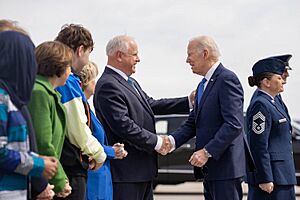
Because he served 24 years in the Army National Guard, Walz was given a special assignment to the House Committee on Veterans' Affairs when he was a new member of Congress.
Walz was a main supporter of the Clay Hunt Suicide Prevention for American Veterans Act. This law helps the Veterans Administration improve mental health care and suicide prevention programs for veterans.
Personal Life
Walz and Gwen Whipple met while they were both teachers in Nebraska. They married on June 4, 1994. Tim, who was raised Catholic, became a Lutheran after marrying Gwen. He calls himself a "Minnesota Lutheran."
The Walzes tried to have children for seven years before their two children were born. Their daughter, Hope, was born in 2001, and their son, Gus, in 2006. They named Hope after their feeling of hope during the pregnancy.
Hope Walz graduated from high school in 2018 and college in 2023. She works as a ski instructor and at a homeless shelter. Hope has appeared in social media ads for Walz's campaigns.
Gus Walz attends high school. He has been diagnosed with non-verbal learning disorder, ADHD, and an anxiety disorder. Hope and Gus appeared at the 2024 Democratic National Convention, where their emotional cheering became very popular online. Videos of Gus became well-known for showing neurodiversity.
The family lived in Mankato, Minnesota, for almost 20 years before moving to Saint Paul when Walz became governor. They live in the Minnesota Governor's Residence. The Walzes have a modest financial profile. They do not own businesses or stocks. Their main assets are their pensions.
The family has a Labrador retriever named Scout, who they adopted after Walz won the 2018 election. Walz's cat, Afton, went missing in August 2023. He adopted another cat, Honey, in December 2023.
Awards and Decorations
Agriculture
In 2017, Walz received the Golden Triangle Award from the National Farmers Union. This award recognized his leadership and support for family farmers and rural communities.
Military
Walz's military awards and decorations include:
| Army Commendation Medal | ||
| Army Achievement Medal
One oak leaf cluster |
Army Reserve Components Achievement Medal
Five oak leaf clusters |
National Defense Service Medal
One service star |
| Global War on Terrorism Service Medal | Armed Forces Reserve Medal
with silver hourglass device |
Armed Forces Reserve Medal
with M device |
| NCO Professional Development Ribbon | Army Service Ribbon | Reserve Components Overseas Training Ribbon
Three oak leaf clusters |
| Minnesota Good Conduct Medal
with silver star |
Minnesota State Active Duty Ribbon
One oak leaf cluster |
Minnesota State Service Ribbon
One oak leaf cluster |
See also
 In Spanish: Tim Walz para niños
In Spanish: Tim Walz para niños
- United States congressional delegations from Minnesota
- List of United States representatives from Minnesota
 | Aurelia Browder |
 | Nannie Helen Burroughs |
 | Michelle Alexander |


